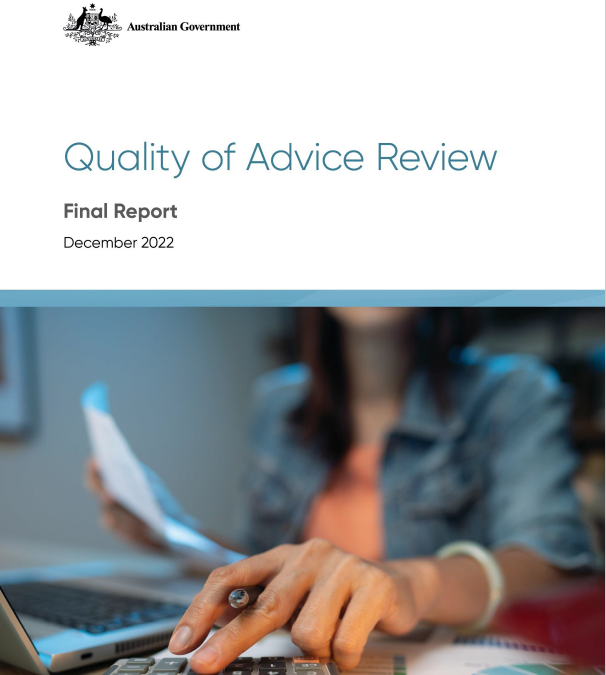
If plumbers need new pipes, and if the cobbler’s kids need new shoes, does it follow that a lawyer needs new laws?
Maybe.
Michelle Levy’s three-page plea to the government to adopt her Quality of Advice Review recommendations in this week’s AFR is a curious political tactic from an esteemed lawyer.
It is another fascinating twist in a thirty-year-old reform tale in which vested interests are growing at comparable rates to the number of Australians needing financial advice.
It has been a long time since financial services passed any ‘pub test’.
This has, however, not deterred most financial services professionals from a chosen career to genuinely assist clients with the expert advice they need to achieve as much as possible in their lives.
Unfortunately, as noted by the famous response from Royal Commissioner Kenneth Hayne as he summarised his 2018 review – “too often the answer seems to be greed”, the marketplace for financial services is increasingly and systemically tilted by an overwhelming gravity of greed created by the lure of enduring rents off the massive and growing pools of Australian’s wealth.
Ms Levy is frustrated by the government’s lack of direction and commitment over the last five months.
Advisers though have been waiting far longer.
QUANTITY OF REVIEWS
Like Ms Levy’s, every review starts strong, promising to resolve new examples of painful life-changing loss suffered by another group of confused and unwitting Australians.
How have past reviews performed regards improving the financial lives of Australians?
Financial Services Reform of 2002 was meant to herald stringent new licensing laws and client documentation standards to ensure confident and informed consumer decision-making on financial products.
Didn’t work.
The 2009 Parliamentary Joint Committee – i.e. the Ripoll Review – recommended a new legislative fiduciary duty on financial advisers.
Didn’t work.
The government’s 2010 “Super System Review”, aka The Cooper Review, mandated a ‘lower-cost’ super framework – My Super – to help make superannuation advice cheaper for more Australians.
Didn’t work.
In 2012, after four years of review, the Accountant Professional and Ethical Services Board (APESB) issued an conflict-free advice standard (APES230), making it mandatory to remove all product bias for any financial advice remuneration received by any Australian accountant.
Didn’t work. The standard was watered down to optional within months of release.
In 2014, David Murray. the former head of Commonwealth Bank conducted the Murray Review and produced the Future of Financial Advice (FOFA) frameworks which recommended lower fees on superannuation.
Didn’t work.
In 2015, the Trowbridge Report produced a better structure for remunerating advisers aligning with clients’ interests.
Didn’t work.
In 2017, the Sedgwick Report, commissioned by the Australian Bankers Association, recommended removing incentives paid to bank staff to re-align a conflicted sales culture.
Didn’t work.
In 2018, the Royal Commission into Misconduct in the Banking, Superannuation and Financial Services Industry revealed widespread bad practices, with damning headlines and some criminal charges. Penalties so far amass to approximately $4.7B.
Ms Levy’s review was a mandated follow-up review of the Royal Commission.
Has it worked?
It’s not looking good.
Particularly while the 2019 Financial Planners & Advisers Code of Ethics built by the now disbanded Financial Adviser Standards and Ethics Authority (FASEA) still sits idly somewhere deep within a department in Treasury.
So every professional adviser in Financial Services understands your frustration Ms Levy waiting for some leadership.
While you and your team have put together a substantive report, financial advisers have put their businesses at risk and endured ridiculous levels of intervention and uncertainty, yet still turn up to help their clients despite the very continuous threat and promise of yet more intervention and change in how they are allowed to operate.
These advisers, like you, are ardent on delivering best interests and were hoping your review might ‘cut through’ with a clear direction.
THE LAW
Per my response to your review, I fear your ‘good advice’ recommendations miss the significant problem close to your professional heart.
No review will ever totally stop todays or future greed.
But today’s law is fundamentally ill-prepared.
I was surprised by a section of your opinion piece in this week’s AFR article, mainly where you referred to your recommendations, “…fixing some problems with the existing law…[which] are small but serious.”
Section Seven of the Corporations Act is seriously ill-written for today’s marketplace.
The Australian Law Reform Commission’s current review of Financial Services legislation (ALRC Report 139) acknowledges that there are at least ten supplementary acts fundamental to licensing and regulatory compliance of advice, making it near impossible for any reader of any one act confident their interpretation has the effect as written.
In the meantime, every financial services compliance officer from Broome to Brisbane is left to consider how much paperwork is required to cover all perceived risks of the advisers they manage.
The law has been written in an era of financial products which does not serve Australians seeking affordable and accessible advice.
As we hurtle in an era of algorithmic product delivery, the gap between the distribution of financial products and the delivery of advice will widen far beyond today’s recognition.
Algorithmic financial product delivery is essential.
Particularly for Australians who consider their financial needs as incidental.
However, it is not advice.
The recommendation to deliver ‘good advice’ is well-intentioned but will add to the confusion and continue the reality of an advice market that fails the ‘pub test’ for any Australian concerned about the consequences of their advice.
Apart from the APESB review, all reviews have failed to return advice to first principles by separating the distribution of advice from the distribution of products, as it has been cited as too hard.
It is hard.
That’s why we need the leadership you seek.
What do you reckon?
Photo credit: https://treasury.gov.au/publication/p2023-358632
